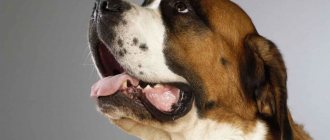All owners of four-legged pets note certain habits and characteristics that their pets have. These features include the tendency of dogs to open their mouths and breathe frequently. This fact is known to all experienced or novice dog breeders who have recently acquired a furry friend. Do you want to know why and how dogs stick out their tongues? Despite the fact that such behavior is typical for animals and is almost invisible to their owner, there are reasons for such behavior in pets. If you are interested in the question of why a dog breathes with its tongue hanging out, we will give a comprehensive answer to it.
Why did the dog stick out its tongue?
Shortness of breath has several good causes. This is a mechanism that helps release heat from a dog's body. Dogs lower their body temperature in this process. Instead of sweating like humans, dogs stick out their tongues. The tongue secretes saliva along with the heat. Evaporation removes heat from the evaporation of a liquid substance or saliva. Evaporation in humans occurs in the form of sweat. On the other hand, dogs have sweat glands on their paws, which contradicts the popular belief that dogs do not have sweat glands. This symptom may be normal, or it may be pathology.
List of diseases in dogs that often cause tongue protrusion:
- Drooping Tongue Syndrome
- Mouth injury
- Behavioral disorder, stress, agitation
- Serious dental damage
- Oral cancer
- Fever
- Pain
You should consider tongue hanging out of your mouth as a disease
, only when the dog repeatedly demonstrates this behavior, even in a calm and comfortable situation. The disease Drooping Tongue Syndrome means a protruding tongue, which is exactly what the name of the disease is. Genetic pathology of small and brachycephalic dog breeds such as pugs.
Breed Features
Some breeds, such as pugs, are inherently prone to respiratory problems. Their nostrils and throat passage are narrowed. They are also much more likely to overheat, which also contributes to increased breathing. Therefore, if a dog breathes frequently with its tongue hanging out, this can be considered normal. A similar phenomenon can be observed when the body temperature rises or the neck is constrained by the collar.
Why does a dog always keep its tongue hanging out of its mouth?
This is not a very important question. Why don't I see other animals with tongues sticking out? This happens under certain conditions. For example, people breathe heavily after heavy exercise.
Kangaroos and felines lick their bodies to remove saliva. Loss of saliva actually means a lack of water in the body. The next time you see your dog tongue-tied, provide him with plenty of water. You may also consider reducing his exercise period. In addition, the dog does this when it is hot or running away from some other animal, as well as immediately after exertion and emotional stress.
How to avoid overheating
- Change your walking time. In the summer, try not to take your pet out during the sunshine, the ideal time is from morning to 9.00 and in the evening no earlier than 18.00.
- Offer to drink . During hot weather, your dog should be offered water more often than usual. It should be clean, cool, but not icy water. For the summer, you can purchase water for dogs with vitamins and minerals at the pet store.
- Do not leave it in the car . If the car is not equipped with air conditioning, the temperature inside in the summer is several times higher than the temperature outside. Therefore, when going to a gas station or to the store, let your vehicle air out and warm up.
- Limit physical activity . Walks should be relaxed.
- Trim the animal . If possible, trim or trim your pet.
Why is evaporation from the paw pads not enough?
The small area of the paw pads does not cover enough workload to cool the entire body, especially when they are in a standing posture. As a result, dogs cool their body through their protruding tongue.
Hot, heavy and fast breathing causes more fluid to evaporate through the tongue in a very short time. Pets require a lot of fluids during this process as they continue to lose water quickly. Dogs will not stick out their tongue because they are lazy or anything, but this act helps get rid of excess heat in the body faster.
The dog holds his tongue to effectively control this entire procedure. Their tongue naturally becomes long and flat and contains a huge number of blood vessels. The blood in the tongue cools through the secretion of saliva before returning to the body.
Pregnant and nursing dog
A pregnant dog breathes frequently if the birth is already close. In this case, her health is not in danger. If after birth breathing does not decrease, and the puppies are stillborn, it is necessary to urgently call a veterinarian, since the animal requires surgical intervention.
If a nursing dog breathes frequently and makes clumsy movements, this indicates that the level of calcium and glucose in its blood is decreasing. In this case, the help of a doctor is also necessary, since otherwise the animal may die.
Why do pugs often have their tongues sticking out?
Pugs and bulldogs have tongues that are disproportionately larger than their oral cavity. There simply isn't enough space inside for proper storage. This can also happen due to their deformed jawbone resulting from problems with the breed.
This problem occurs constantly; the body loses all moisture, leading to a dry tongue. A tongue without moisture will dry out, crack, and show symptoms such as bleeding, damage, or sores. In this case, the pet will feel pain. In severe cases, contact your veterinarian. In general, stick to your general dog grooming program. But if your pet is doing this because of its genetic background, there is little you need to do in this regard. You can wipe away the saliva from time to time using a dog towel.
Heart failure
Listed above are all the main possible reasons when a dog is breathing frequently. But the most common disease is heart failure. We'll tell you about it in more detail. All heart diseases can be divided into three groups:
Congenital defects are more common in young pets. Very often in this case, animals die, since the body is still quite weak. Acquired defects, as a rule, occur in middle-aged animals, and age-related defects occur in animals older than eight years. In addition to rapid breathing, heart disease may cause other symptoms in pets.
Small dogs stop playing, sleep longer, and do not gain weight at all due to the fact that they do not eat well.
Adults may experience shortness of breath even at rest. The dog is very lethargic and may faint during a quiet walk. There is a possibility of rapid weight gain due to high water consumption.
All of these symptoms are causes of heart problems in your pet. This can also include unsteady gait, weakness, and refusal to eat.
If rapid breathing is a sign of heart disease, you should switch your pet to feeding in small portions, and also reduce the amount of physical activity and walks. The doctor must prescribe special medications. They should be taken exactly as directed.
What is hanging tongue syndrome?
Well, hanging tongue syndrome
is one of the reasons why a dog sticks out its tongue. In this condition, the dog simply cannot control his tongue for several reasons. There may be birth defects, trauma cases, or neurological disorders. His tongue constantly remains out of his mouth as a direct result of the above reasons.
Typically, brachycephalic dog breeds suffer from overbiting or overbiting, and they are usually the biggest victims of this condition. This can harm the dog's natural body function. He will have trouble eating or grooming. Moreover, the tongue sometimes loses moisture, which leads to cracks and bleeding. In winter, this vital organ can even get frostbite. In general, hanging tongue syndrome puts your dog closer to various infections.
To treat it, you need to find the exact cause. Dogs suffering from this syndrome need to be given painkillers and soft food.
Causes of rapid breathing
Here are the 5 most common causes of shortness of breath in dogs.
Cooling
Breathing rapidly allows your dog to release heat by exchanging it for cooler air. However, as you might imagine, this process is not very efficient.
This is especially true for short-faced dogs (for example, bulldogs or pugs). Now you understand why dogs begin to choke in hot conditions. The hotter the dog gets, the more pronounced its breathing. Heavy breathing is often accompanied by drooling and a brighter coloration of the tongue and gums.
In addition to suspicious shortness of breath, signs of overheating include a bright red hanging tongue and gums, wide eyes, and obvious weakness.
Take measures to prevent your pet from overheating; try to minimize exposure to heat in hot weather. Your dog should be safe. Never accidentally or intentionally leave your dog alone in a car because it gets hot quickly. If you suspect a problem, take your dog to see a veterinarian.
If the outside air temperature is comparable to the puppy's body temperature (38.8 degrees), shortness of breath will not help him cool down effectively, and the animal is at risk of heatstroke.
How does a puppy develop from birth during the first week of its life?
A dog can burrow into the ground on its own to cool its body.
Anxiety or stress
Shortness of breath is not only a sign of hyperthermia.
Everyone knows that dogs begin to choke when they are afraid, anxious, or stressed. Examples include car rides, fireworks, separation anxiety, vet visits, and many other stressful situations.
Study your dog's body language and you can tell if your pet is showing signs of fear.
A clear understanding of the cause of the dog’s fear or anxiety helps to minimize unpleasant and dangerous incidents. If you think the panting is due to fear, anxiety or stress, remove your dog from the situation as quickly as possible.
Many Dogs Breathe Heavily When They Play
Puffing is often a sign of a happy dog. If this is true, then the rest of her torso will eloquently confirm her happy mood.
The tail wags energetically and joyfully. The body and facial features of the pet are somewhat relaxed. The eyes seem bright and glow with happiness.
After the animal calms down, its breathing will slow down, and eventually the shortness of breath will stop. Brief, light, rapid breathing with an open mouth and bright eyes is normal for a relaxed and contented dog.
In fact, many people genuinely think it's a dog smile.
Pain or discomfort
Dogs are good at hiding pain and illness from us. Some of them try harder to hide their discomfort.
However, when a certain level of discomfort is reached, it is more difficult to hide it due to, for example, heavy breathing.
Watch for other signs of illness and pain, such as vomiting, refusal to eat, diarrhea (diarrhea), weakness, limping, anxiety, and behavioral disturbances.
Contact your veterinarian if you suspect illness or injury in your dog.
If at any point you are sure that the breathing has become too intense, and there is no obvious reason, immediately go to see a veterinarian. It's always better to play it safe to avoid imminent disaster.
Obesity in dogs











